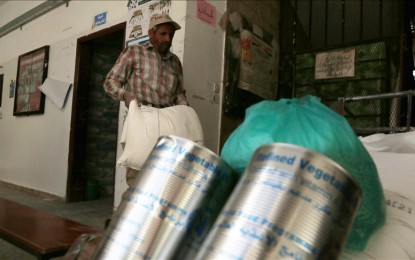
FOOD AID RESUMPTION. The World Food Program resumes food aid to Ethiopia following its suspension in June amid widespread reports of donations being stolen. The suspension caused thousands to suffer from hunger. (Anadolu)
NAIROBI, Kenya – The World Food Program (WFP) said Tuesday that it has resumed crucial food distribution in Ethiopia following its suspension in June amid widespread reports of donations being stolen and diverted.
In a statement to Anadolu, the UN food agency said it was now being even more cautious with its food operations in the country, where a humanitarian crisis has been unfolding due to famine and civil conflict in the Tigray region.
It said it had commenced the distribution of 15 kilograms (33 pounds) of pre-packed wheat in bags to more than 100,000 eligible beneficiaries in four districts in Tigray.
"The test distributions are being rolled out at seven food distribution points where WFP and partners have completed targeting of beneficiaries and digitally registered them," it said.
New measures to prevent illegal food diversion to local markets include "new bag markings to allow for precise tracking of food commodities; strengthened complaint and feedback mechanisms including help desks and hotlines; and enhanced training for humanitarian partners."
The WFP said it plans to begin registering vulnerable populations in Ethiopia and rolling out enhanced control measures for people in the Amhara, Afar and Somali regions as well as other parts of the Tigray region.
The suspension of food aid began in June and has caused thousands to suffer from hunger, particularly in the war-torn Tigray region.
The two-year conflict across Ethiopia disrupted crucial agricultural activities, uprooted farmers from their lands, and hampered the transportation and distribution of essential sustenance.
Consequently, widespread food shortages have led to an increase in hunger and malnutrition rates. (Anadolu)
